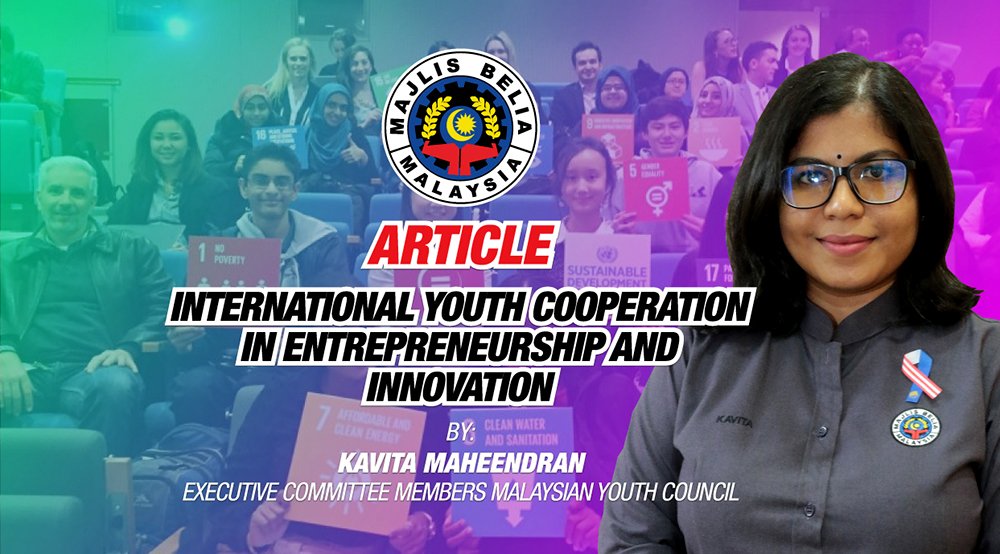By :
Kavita Maheendran
Executive Committee Members
Malaysian Youth Council (MBM)
As we accept the growth of modern technology, borderless world is being realised day after day. Many might point out how one’s origin, culture and tradition background is being forgotten and erased but I see it otherwise. There are endless possibilities, ideas and dreams are brought to life but most of all we are becoming closer as one race – the human race.
In each nation, youths are often referred as the future leaders, backbone of a country and even people of tomorrow. With many platforms and organisations available – we are able to learn and exchange ideas on matters concerning the betterment of societies. According to United Nations, they identify entrepreneurs as “drivers of innovation” and “change agents”, where these entrepreneurs provide win-win solution and they are also recognised as key people to achieve Sustainable Development Goals (SDG). With that thought, youths are encouraged and programmes are curated to instil the right mindset in becoming ‘innovative-entrepreneurs’.
It is clear that the role of young people is essential to the world’s economy. The current youths are the largest generation in history and almost 50 percent of millennials make up the global workforce. With this increasing number in young labour force, there is an increasing need to explore alternatives to traditional job-creation strategies. This high number of youngsters, threatens to result in unemployment and pressing social challenges. Furthermore, in most polls and surveys conducted by various bodies across the world has highlighted two main concerns; (i) finding a well-paying job after graduation and (ii) youths do not know how they would manage their finances after school.
This problem is not only affected in a certain country but worldwide. Hence, it is important for youths to collaborate at International level in order to overcome challenges faced by societies. For instance, Arunachalam Muruganantham or known as the “pad man” for his creation. Many Indian women in India are practicing unhygienic method while they’re menstruating. He created revolution by producing a machine that makes low-cost sanitary napkin and its changing the lives of thousands of women across the world. Another inspiring story that I’d like to share is William Kamkwamba – a Malawian boy who brought electricity to his village using makeshift wind turbine. He was only 14 years old when he got started on building a windmill and all he had by way of instruction or guidance at the time was a book.
These stories are not only to uplift your spirit or to inspire you but these stories are to tell that, we are able to solve many problems and shortcomings through innovation. Based on my personal observation, I noticed that most of the countries face similar day-to-day challenges; especially Asian countries. This is an opportunity for all of us to come together and work towards solving the problem. So how can we equip our youths into entrepreneurship and innovation? I have three suggestions that we can look into.
A strong, unified entrepreneur community starts with a quality education. Firstly, we have to (i) foster an entrepreneurial mindset, attitude and culture. This should be targeted at educational level where schools should incorporate from projects in schools (including the creation of mini-education enterprises) to workshops, platforms, competitions of ideas and etc. Education shouldn’t only look into the theoretical part of it; the practical lessons should also be taught. In this day, entrepreneurship and innovation is seemingly important for youngsters to adopt so that they will be financially independent. Adding on, each nation should review educational priorities to ensure young people access to the knowledge and skillsets vital to today’s technological and business realities.
Listed were digital competencies, STEM education and venture-creation skills. It was also recommended that education systems be streamlined to reduce the fragmentation of knowledge in academic disciplines and emphasize ethical competency. In other words, young people should be encouraged to develop business skills and entrepreneurial thinking, regardless of their field of study. Despite a growing international interest in entrepreneurial endeavours, most education systems still refute the importance of values like entrepreneurship, creativity and innovation. Yet, business skills, more than ever, are essential tools for the future generation of young professionals.
Secondly, (ii) ensuring youths are adopting digitalisation. With rapid technology growth, it gives us no reason to not be tech-savvy. Our daily life is depended on it, the moment we are awake; we pick up our phone to scroll through our social media platforms. Many of us have been ingesting news via social media platforms. Youths should grab the training opportunities of digital platforms, Internet of Things (IoT), Artificial Intelligence (AI)/Virtual Reality (VR) and big data. Becoming tech-savvy shouldn’t be seen as a burden, instead it should be seen as a window of opportunity.
Of course the Internet is like the seven seas altogether and we are merely common fishes in it. If you are visionary and you are constantly aiming for greater things then, you should not be the ordinary fish but look for ways that will make you stand out from the crowd. In a recent viral story from Malaysia, a mother who works from home earned four-figure income by selling snacks and other basic household items to Americans and Europeans on eBay. Whether you’re selling a traditional recipe or a latest gadget, learning digitalisation will help to stretch the possibilities of generating even more profit.
Thirdly, we can look into making (iii) entrepreneur mobility across countries with “entrepreneur visa”. This initiative will be helpful to many young entrepreneurs as they are exploring the initial stage of their idea and innovation. By allowing seamless mobility across countries; due to the diversity of cultures and economic circumstances throughout the world, however, international markets offer opportunities for entrepreneurs to find early adopters. This will indirectly motivate young entrepreneurs to think beyond and produce a high quality product or service that will be accepted by various groups of people.
So, why should entrepreneurs struggle to find product-market fit in their local region if the problem they are solving is more pressing and the demand higher in an international market? Though “going global” may not always be the first idea young entrepreneurs have, this may be the direction many should consider to get market traction and reach profitability faster. If this initiative is supported by participating countries, it would encourage the free movement of innovation and technology, would make going global easier and would reduce struggles for market validation. Apart from that, this will mostly likely aid to combat migration issues. By simplifying the migration process for young entrepreneurs could significantly motivate young people to grow their businesses internationally and promote the free flow of innovative talent across borders.
In conclusion, we all should welcome International cooperation amongst countries so that we can empower young entrepreneurs and innovators to grow. We can tackle many issues like climate change, gender inequality, unemployment, lack of resources and many more through constant engagement between countries. This will create forward thinking young leaders who can contribute at both global and regional platforms. Plus, this will increase their engagement and exchange, direct access to markets, investors and financiers via multiple available online platforms. I hope, we will be able to inspire many youths, to aspire in becoming entrepreneurs and innovators; and eventually will go on to become world changemakers in near future.
Date: 23rd September 2020










